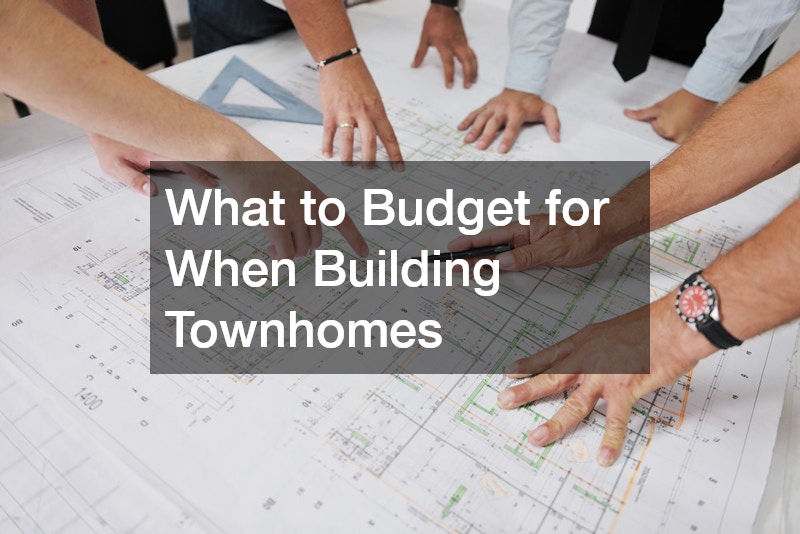
Building townhomes presents a unique set of challenges and opportunities, which can lead to significant financial investments. By understanding the essential costs associated with this process, potential developers can better prepare themselves for the journey ahead. This article outlines key budgeting factors, helping you navigate the complexities of building townhomes while ensuring that your finances remain in check.
From land acquisition to utility installation, every step in the building process demands careful financial consideration. Engaging with experienced professionals, like architecture firms and construction contractors, can provide insights into both expected costs and potential savings. By examining various aspects like labor costs and necessary permits, you’ll be well-equipped to set a comprehensive budget for your townhome project.
As we explore the essential areas to consider when budgeting for building townhomes, remember that the costs can vary based on location, market trends, and project scope. Flexibility in your budget will accommodate unforeseen expenses and allow for enhancements that could elevate the quality of your project. With this foundation, let’s delve into the critical areas needing financial allocation, leading to a successful building experience.
1. Land Acquisition Costs
The cost of acquiring land plays a significant role in the budget when building townhomes. These costs can vary based on location, accessibility to amenities, and zoning regulations. A thorough analysis of the land, taking into account future growth potential and neighborhood dynamics, will be necessary to justify the investment.
While exploring land options, it’s essential to work with local real estate professionals who understand market trends and property values. Moreover, be prepared for additional expenses like property taxes and potential land clearing, which could escalate the overall acquisition costs. Understanding these factors will aid in making informed decisions and planning for a financially sound project.
In some cases, the selected land may require unforeseen modifications, such as well drilling for water access. Engaging with specialists in these areas, including local contractors and qualified professionals, can help foresee these expenses and integrate them into your initial budget. Ultimately, allocating adequate funds for land acquisition is the first step in laying the groundwork for your townhome project.

2. Architectural and Engineering Fees
Engaging with architecture firms is crucial when building townhomes, as they help mold your vision into a tangible plan. These professionals typically charge percentages of the total project cost or flat fees, depending on their level of involvement. It’s important to align your budget with these fees early on, as quality architectural design will directly impact your townhome’s functionality and aesthetic appeal.
In addition to architectural fees, engineering costs should also be factored into your budget. Hiring qualified engineers ensures that your project adheres to local regulations and construction standards, significantly reducing the risk of compliance issues. Engaging these professionals during the initial planning stages allows for thorough reviews of site conditions and potential challenges, which helps mitigate unexpected expenses later in the construction process.
As you finalize your agreements with architecture firms and engineers, ensure you have a clear understanding of their scopes of work, payment schedules, and what to expect during the process. Maintaining open lines of communication will facilitate smoother adjustments as designs evolve, ultimately leading to a more successful building experience. By investing in quality architectural and engineering services, you’re setting a strong foundation for your townhome project.
3. Municipal Permits and Approval Fees
Before construction can begin on your townhome project, securing the necessary municipal permits and approvals is vital. Each city or county has its own requirements regarding these fees, and they can range from a few hundred to several thousand dollars. Understanding the local regulations and permit processes will help streamline your budget, ensuring you allocate enough funds without encountering surprises.
Obtaining permits often includes environmental impact assessments, building inspections, and adherence to zoning laws. Engaging local professionals familiar with the permitting process can speed up approvals and help avoid delays that could inflate costs further. Additionally, certain permits may involve ongoing compliance fees throughout your building project, so it is prudent to factor these into the overall budget.
By keeping meticulous records of all permits and payments to municipal authorities, you can provide transparency in your financial oversight. This practice not only prepares you for any legal inquiries but also assists in maintaining a clear overview of your project’s financial health. Mindful budgeting around these fees will ultimately contribute to a smoother building experience.
4. Construction Materials
When it comes to building townhomes, selecting the right construction materials is crucial for both budgeting and quality. Material costs can vary significantly based on the suppliers, quality required, and sustainability concerns. Comprehensively researching different materials, including their longevity and maintenance requirements, will assist you in making informed purchasing decisions.
Building townhomes often requires various materials—such as framing, siding, roofing, and interior finishes—each with its associated cost implications. Additionally, it can be beneficial to establish a relationship with roofing contractors and other manufacturers, ensuring access to competitive pricing and potential bulk discounts. Properly evaluating these material choices against your budget will aid in maximizing value while minimizing risks associated with the project.
Lastly, consider potential disruptions in the supply chain, which could affect material availability and costs. Regular updates from suppliers and contractors will keep you informed about ongoing trends in pricing and availability, allowing prompt budget adjustments when necessary. Maintaining flexibility within your material budget is integral to the success of your townhome construction.

5. Labor Costs
Labor costs are one of the most significant expenditures when building townhomes, encompassing wages for both skilled tradespeople and general labor. When hiring labor, assess the qualifications of potential subcontractors, including plumbers, electricians, and framers. This scrutiny is crucial because the quality of workmanship will affect not just the building’s safety and functionality but also its long-term maintenance costs.
Hiring local contractors can help with budgetary considerations, as they often understand the prevailing wage standards in your region. Additionally, negotiating pricing can lead to more favorable labor costs, especially for larger projects that require multiple subcontractors. Remember to factor in costs related to labor insurances and worker protections, as these are essential for compliance and overall project success.
Monitoring labor performance throughout the project ensures that schedules are met and costs are controlled. Regular communication with your teams will lead to more efficient workflows and quicker problem resolution, preventing costly project delays. Building townhomes effectively requires meticulous planning of labor resources, and diligent budget tracking ensures that your project remains financially viable.
6. Utility Installation
Installing utilities is another critical component of your townhome budget. This encompasses water, electricity, gas, a propane tank, and sewer connections, all of which require skilled professionals for proper installation. Working with reliable local service providers is integral to ensuring that these installations meet current codes and function correctly upon completion.
Costs can vary widely based on existing infrastructure and location, so understanding what each utility installation entails is essential. For instance, well drilling might be necessary in certain areas for water services, while others may require connecting to municipal water systems, with fees differing greatly between the two. Engaging properly licensed contractors will ensure all work meets local regulations, saving potential costs related to compliance issues down the line.
Be prepared for additional expenses associated with utilities, including installation permits, ongoing service fees, and any necessary upgrades to existing systems. Ultimately, ensuring that your budget accommodates all utility installation costs is crucial for the successful completion of your building project. Comprehensive planning and early engagement with utility specialists will lead to a more seamless development experience.

7. Site Improvements
Site improvements can significantly enhance the appeal and functionality of your townhome project. This includes landscaping, paving, an overhead door company, and local fencing companies, all of which contribute to the project’s overall aesthetics and value. Collaborating with local fence companies and paving contractors can yield insights into current trends and help structure your budget more effectively.
The costs associated with site improvements can vary widely based on design preferences and material selections. For instance, opting for high-quality paving or privacy fencing may improve the property’s value but can also inflate your budget. Weighing the benefits of these improvements against budget constraints and potential returns on investment is crucial during this phase.
Moreover, professional landscaping can attract potential buyers and increase overall satisfaction for residents in the townhome community. Factors to consider may include irrigation systems and hardscaping, which could considerably enhance outdoor areas. Allocating appropriate funding for site improvements not only enriches the townhome project visually but also improves living conditions for future occupants.
8. Interior Design and Decoration
Interior design is paramount when building townhomes, as it aims to enhance residents’ living experiences. Engaging with designers can provide a professional touch that elevates the overall ambiance of the space. Create a budget that allows for thoughtful investments in quality materials and finishes that reflect your target market.
Interior elements such as flooring, cabinetry, and fixtures can vary greatly in cost, making it vital to tread carefully with your selections. These design choices will affect how potential buyers perceive the value of the property, reinforcing the need to spend wisely without compromising on essential elements. This balance is key to creating appealing townhomes that resonate with prospective buyers.
Additionally, consider functionality alongside aesthetics when planning your interior decor. Employing the expertise of specialists in this field can lead to innovative ideas that optimize living space without sacrificing style. By investing in thoughtful design, you can create beautiful, functional homes that enhance both resident satisfaction and property value.
9. Financing and Loan Interest
Finding the right financing options is a critical component of successfully building townhomes. Interest rates can fluctuate, affecting your overall cost of borrowing and impacting your project’s affordability. Shopping around for loans and understanding the terms, such as loan type and repayment schedule, is integral for informed financial planning.
Engaging with financial advisors can provide additional insight into securing favorable terms while ensuring your proposed project fits within budgetary constraints. Make sure to calculate all financing costs, including upfront points, monthly payments, and closing costs, to ensure affordability throughout the project lifespan. Streamlining your financing process can lead to significant savings.
It’s also important to stay aware of potential market changes that could impact interest rates and borrowing capabilities. A proactive approach, including regular reviews of your financial plan, will ensure that you’re prepared for shifts that may arise during construction. Proper financing management will enable your townhome project to move forward smoothly while maintaining financial stability.

10. Contingency Funds
Setting aside contingency funds is an essential practice when building townhomes, as it provides a buffer against unforeseen costs. Various challenges can arise during construction—from delays in material supply chains to unexpected site conditions—that could impact the budget. Allocating a percentage of your overall budget, typically between 5% to 15%, for contingency is prudent to prepare for these eventualities.
A well-defined contingency budget allows for more flexibility, ensuring that your project can adapt without severe financial strain if issues arise. Regularly reviewing and adjusting this fund will provide additional peace of mind, should any problems necessitate immediate attention. Utilizing this fund wisely as real challenges occur can mitigate potential adverse effects on your overall building timeline.
Ultimately, proactive contingency planning protects the investment made in building townhomes, ensuring that you maintain quality throughout every phase of construction. Continual assessment of potential risks, accompanied by open communication throughout the team, will lead to more efficient problem-solving. By preparing for the unexpected, you position your project for success.
Conclusion
Building townhomes involves careful consideration of numerous budgetary factors, making it essential to be well-informed from the outset. Each section we’ve explored plays a vital role, ensuring that you allocate resources wisely while addressing critical needs. By investing in quality professionals, managing costs, and preparing for potential challenges, you can set your project up for long-term success.
From land acquisition to the interior design process and clean-up plan with dumpster rental delivery services, a well-planned budget will streamline your decision-making, ultimately leading to a thriving community of townhomes. Through thoughtful planning, collaboration with experts such as architecture firms and local contractors, and diligent monitoring of finances, you can navigate the complexities associated with building townhomes with confidence. Ultimately, forging a sustainable pathway can enhance the longevity and appeal of manufacturing these community living spaces.



